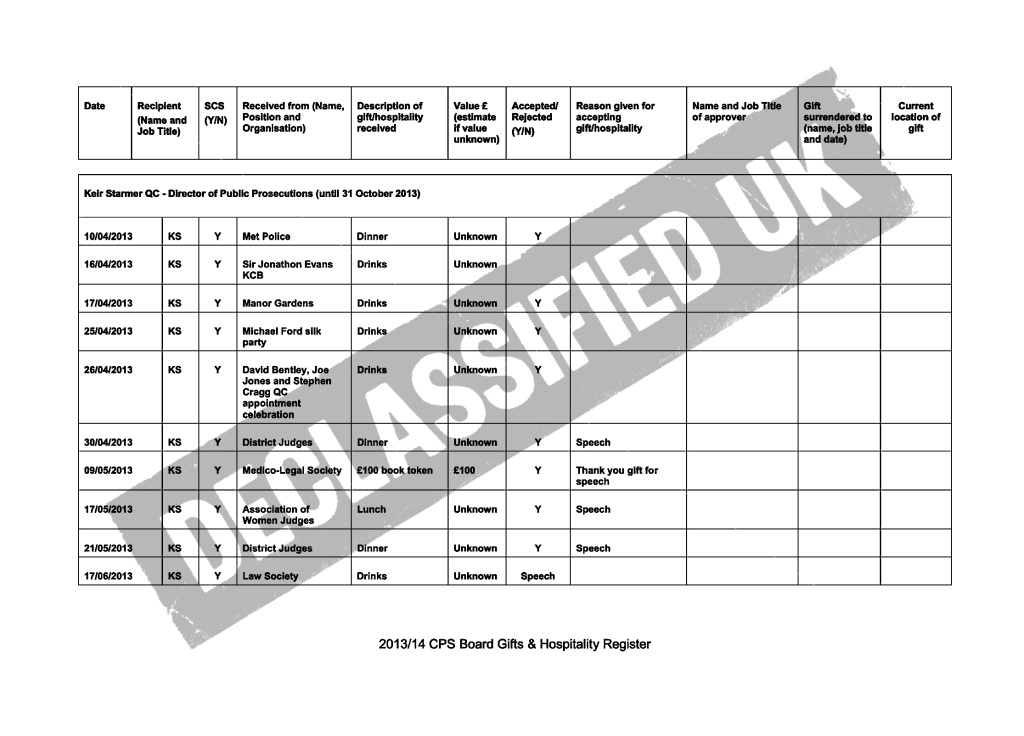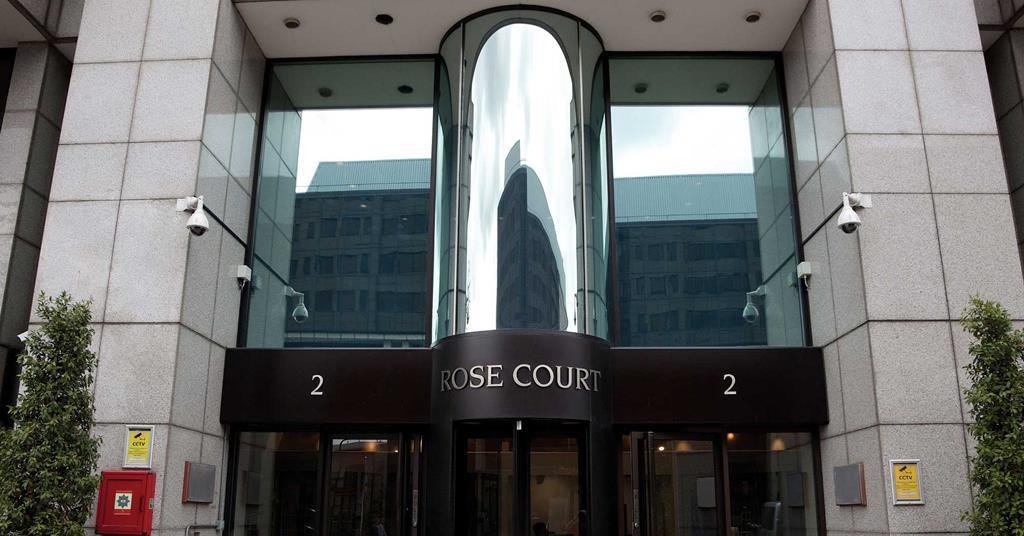
The year after he protected Jonathan Evans from possible prosecution, the U.K. Labour leader — then senior public prosecutor — went to the spymaster’s farewell drinks, paid for by the security agency, Matt Kennard reports.
By Matt Kennard
Declassified UK
- Starmer refused to prosecute MI5 for its role in the torture of Binyam Mohamed, which “delighted” the agency’s chief Jonathan Evans
- Evans tells Declassified Starmer attended his MI5 leaving party the following year, but “does not now recall” if he spoke to Starmer
- Evans could have been criminally liable if Starmer had decided to prosecute MI5
- Declassified could find no record of any other director of public prosecutions socialising with the head of MI5
- But Starmer does not respond to Declassified’s questions about his attendance at the MI5 party
- Starmer also attended “networking reception” for Foreign Office ministers three months before he announced his decision not to prosecute MI6, an agency overseen by those ministers

The leaving party took place on April, 16l 2013 when Keir Starmer was director of public prosecutions, the most senior public prosecutor in England and Wales.
Starmer recorded in his Crown Prosecution Service hospitality register that he had “drinks” with “Sir Jonathon [sic] Evans KCB.” KCB stands for Knight Commander of the Order of the Bath, a knighthood awarded by the British Crown of which Starmer is also a recipient.
Lord Evans, who is now a cross-party peer, told Declassified: “Your research might have revealed that I retired from MI5 on 21 April 2013. The event in Mr Starmer’s register was farewell drinks a week or so before my retirement.”
Evans added: “Mr Starmer was one among many guests. I do not now recall whether I spoke to him.”
Evans did not address Declassified’s questions about whether he had met with Starmer before or after his farewell drinks — or if a relationship persists.
Labour Leader Starmer, meanwhile, did not respond to any of Declassified’s questions about his attendance at the MI5 party.
The Crown Prosecution Service has a different register for official meetings with external organisations suggesting Starmer saw it as a social meet-up with Evans. MI5 is not mentioned in the entry.
The fact the drinks were listed in Starmer’s hospitality register also indicates they were paid for by MI5. Starmer states that the value of the drinks bought for him is “unknown.”
Declassified could find no record of a director of public prosecutions before or after Starmer accepting hospitality — or meeting with — an MI5 chief, including upon their retirement. The Crown Prosecution Service says it is “independent” and makes its “decisions independently of the police and government.”

Keir Starmer’s hospitality register shows he had “drinks” with then MI5 chief Sir Jonathan Evans in April 2013.
MI5 & MI6 Investigated
Starmer was appointed director of public prosecutions in November 2008 and served for five years. He left the Crown Prosecution Service six months after Evans’ leaving party — and became a Labour MP at the 2015 election.
Meanwhile, Jonathan Evans joined MI5 in 1980 at the age of 22. During the 1990s, he had various postings in Irish counter terrorism operations, before being appointed director-general in April 2007, serving for six years.
One case which would become notorious from Evans’ time at MI5 was that of Binyam Mohamed, a British resident.
Mohamed had been arrested in Karachi, Pakistan, in April 2002 and interrogated for a week allegedly with various torture techniques. Mohamed said that as well as being questioned by his American captors, an MI5 officer, later known as Witness B, had also taken part.
It was later revealed that MI5 knew he was being mistreated before an officer was sent to Karachi to question him.
Mohamed was then transported to Morocco by the C.I.A. and again interrogated by Witness B, despite MI5 claiming it did not know his whereabouts in the North African country.
Mohamed eventually spent seven years at Guantanamo Bay, the detention facility run by the U.S. on Cuba, before being released without charge and receiving a secret payout from the U.S.
Scotland Yard began an investigation into MI5’s interrogation of Binyam Mohamed in March 2009. However, in November 2010, Starmer, as director of public prosecutions, decided that there was “insufficient evidence” to indict Witness B, although investigations continued.
‘I Am Delighted’
Starmer’s decision not to prosecute MI5 was surprising: it was reported, for example, that the agency’s telegrams to the C.I.A. demonstrated that British intelligence officers fed the U.S. information on Mohamed when he was being tortured in Morocco.
Upon Starmer’s announcement, then MI5 chief Evans said: “I am delighted that after a thorough police investigation, the Crown Prosecution Service has concluded that Witness B has no case to answer in respect of his interviewing of Mr Binyam Mohammed.”
Evans continued: “Witness B is a dedicated public servant who has worked with skill and courage over many years to keep the people of this country safe from terrorism and I regret that he has had to endure this long and difficult process.”
Evans’ relief was understandable. The Crown Prosecution Service’s role also involved attempting to trace responsibility for Witness B’s actions further up MI5’s “chain of command” and considered “possible criminal wrongdoing.”

Clive Stafford Smith, Mohamed’s lawyer, said before Evans was cleared that he could ultimately face criminal responsibility for British complicity in the torture.
Evans wrote a newspaper article defending MI5’s actions, insisting that his staff had operated within the law. He wrote that MI5 did not carry out torture, and “nor do we collude in torture or encourage others to torture on our behalf.”
It is likely that Evans played a role in the Mohamed case as it unfolded. In September 2001 Evans had become director of international counter terrorism at MI5 and was in this position when Mohamed was snatched, tortured and rendered by the C.I.A., with MI5 involvement.
Evans later had to defend MI5 from accusations of a cover-up in the Mohamed case after Lord Neuberger, then president of the Court of Appeal, said there was a “culture of suppression” in the agency.
Investigations Continue
Allegations made by Mohamed against MI5, and the role of MI6, Britain’s external intelligence service, meant a “wider investigation” continued after Starmer’s 2010 decision. This included new allegations by another detainee about British involvement in torture at Bagram air base in Afghanistan.
In January 2012, however — after 30 months of investigation by the police — Starmer again decided against prosecuting anyone from MI5 for their role in torture. MI6 was also cleared.
Starmer said at the time there was evidence showing MI5 “provided information” to the C.I.A. about Mohamed and “supplied questions” for them “to put to Mr Mohamed while he was being detained.”
But Starmer concluded that there was “insufficient evidence to prove to the standard required in a criminal court” that any spies provided information when they knew “there was a real or serious risk that Mr Mohamed would be exposed to ill-treatment amounting to torture.”
On the allegations against MI6 from Afghanistan, Starmer again concluded “there is insufficient evidence to provide a realistic prospect of convicting [the MI6 officer] of any criminal offence.”
Starmer’s hospitality records also show that on 10 October 2011 — three months before he made this decision — he attended a “networking reception” for ministers from the British Foreign Office, which oversees MI6.
The column for the value of the hospitality Starmer received from the Foreign Office is left blank. Declassified could find no record of a director of public prosecutions before or after Starmer attending a similar event for British foreign ministers.
The Crown Prosecution Service initially told Declassified it could not provide Starmer’s full hospitality records. “In line with its retention policy, the CPS no longer holds records pertaining to the Gifts and Hospitality Register for financial years 2007-08 to 2010-11 as requested,” it told us.
Matt Kennard is chief investigator at Declassified UK. He was a fellow and then director at the Centre for Investigative Journalism in London. Follow him on Twitter @kennardmatt
This article is from Declassified UK.
Support Independent Journalism Today
Our unwavering dedication is to provide you with unbiased news, diverse perspectives, and insightful opinions. We're on a mission to ensure that those in positions of power are held accountable for their actions, but we can't do it alone. Labour Heartlands is primarily funded by me, Paul Knaggs, and by the generous contributions of readers like you. Your donations keep us going and help us uphold the principles of independent journalism. Join us in our quest for truth, transparency, and accountability – donate today and be a part of our mission!
Like everyone else, we're facing challenges, and we need your help to stay online and continue providing crucial journalism. Every contribution, no matter how small, goes a long way in helping us thrive. By becoming one of our donors, you become a vital part of our mission to uncover the truth and uphold the values of democracy.
While we maintain our independence from political affiliations, we stand united against corruption, injustice, and the erosion of free speech, truth, and democracy. We believe in the power of accurate information in a democracy, and we consider facts non-negotiable.
Your support, no matter the amount, can make a significant impact. Together, we can make a difference and continue our journey toward a more informed and just society.
Thank you for supporting Labour Heartlands











